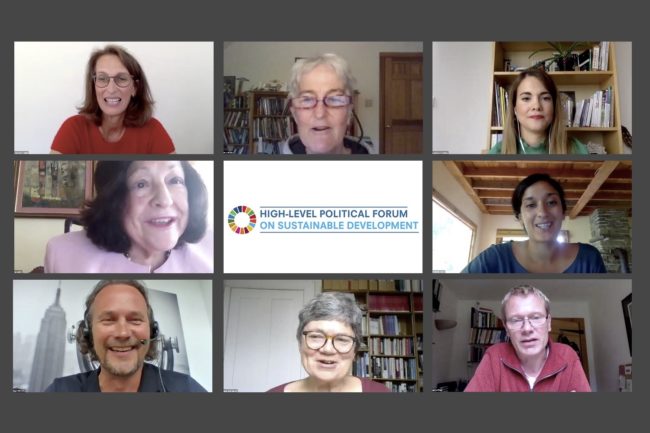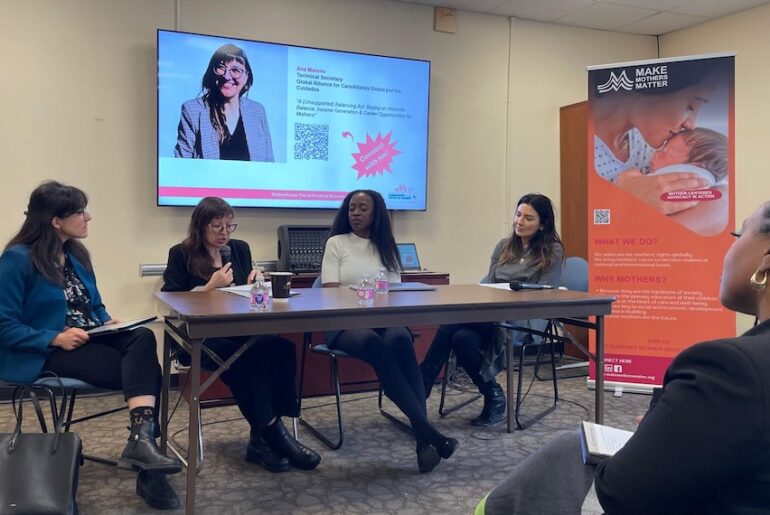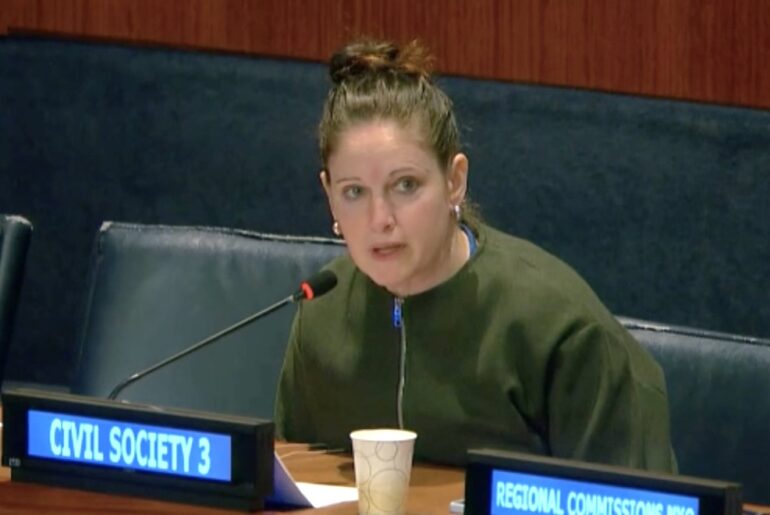Placing Care & Education at the heart of a new economic system
28.07.20
UN New York, High Level Political Forum - report and recording of the MMM Side-Event

On 16 July 2020, MMM organized a webinar on ‘Care and education – Cornerstones of just and sustainable economies’ to discuss the economics of care and education. This HLPF side-event aimed at contributing to the current discussions on ‘building back better’ by
- Spotlighting the failings of our current economic system in recognising the essential role of Care, especially unpaid care work
- Making the case for a paradigm shift in our economic thinking: spending on care and education must be seen as investments not expenses
- Calling on governments to action: Covid-19 and its economic devastation offers a unique opportunity to move beyond GDP and prioritize care for wellbeing, sustainability and equity in our economy.
Watch the recording
Read the Report…
![]() Full report on MMM HLPF 2020 side-event
Full report on MMM HLPF 2020 side-event
The key takeaways
- Like other commons, care must be a collective concern and responsibility. It’s time to widen the discussion beyond academics and policymakers to include the general public, by translating the research and advocacy into ordinary language and make them as compelling as possible. The Covid-19 crisis provides us an opportunity, to wrap-up and be more proactive.
- Care for children must be considered as an investment and the time spent on raising children by parents, families and community also factored-in. In particular, Early Childhood Development (ECD) strategies and services have the transformative power to reduce poverty, inequity and violence, and thus build a strong foundation for peace and security, resilience, social justice and cohesion. Supporting mothers/parents/families for ECD is a high returns investment and is more important than ever.
- At the company level, promoting the wellbeing of people at work through simple policy and dialogue is also cost effective – it improves performance and also positively impacts life and health at home, especially for working mothers.
- Moving beyond GDP and profits as drivers of our economies has become a necessity. Among the hundreds of alternate indicators or dashboards, a few are important and could be identified as interesting for an organisation like MMM to focus upon and try to influence so that care and education are part of a new economic system. However, Time-Use Surveys, which provide key data on care and wellbeing, remain a bottleneck.
- The unequal distribution of unpaid care work is at the centre of the spiral of gender inequalities. “Building back better” must prioritize care and education, i.e. social infrastructure over physical infrastructure. Investing in care is sustainable, generates jobs and reduces the gender employment gap. Care should be mainstreamed in all policy-making.
- Care is at the heart of wellbeing. The governments of Iceland, New Zealand, Scotland and more recently Wales are showing us a way towards wellbeing economies, with new narratives and visions about how the economy can work to serve human and ecological wellbeing. Each country has developed its own framework for monitoring national progress in aligning economic policy with culture, value and wellbeing goals. These frameworks are the result of a participatory process to assess what matters to people.
Many thanks to our speakers for their rich and varied contributions and recommendations
- Nancy Folbre, Feminist Economist and Professor emerita of Economics and Director, Program on Gender and Care Work, Political Economy Research Institute, University of Massachusets Amherst – PowerPoint presentation
- Rima Salah, Chair, Early Childhood Peace Consortium
- Valentina Urreiztieta, Psychologist, Empreintes Humaines – PowerPoint presentation
- Rutger Hoekstra, Founder, MetricsForTheFuture.com – PowerPoint presentation
- Susan Himmelweit, Feminist Economist and Emeritus Professor, Open University (UK) and coordinator of the Policy Advisory Group of the Women’s Budget Group – PowerPoint presentation
- Amanda Janoo, Knowledge & Policy Lead, Wellbeing Economy Alliance
- Duncan Fisher, Campaigner for child wellbeing and wellbeing
See also
- this first article on the event for additional background information
- the article on the Wellbeing Economy Alliance website on our event
Time Poverty and the Motherhood Penalty
Unveiling Economic and Social Injustices
09.07.24
Mothers play an essential role in families by ensuring their loved ones are nourished, educated, and healthy, but their unpaid care work often leads to economic and social injustices, known
Envisioning care as a common thread to global crises
29.07.24
UN New York - Our virtual HLPF side-event brought together experts to shed light on how the various global crises we face (in particular climate change and other environmental crises,
We call for multi-stakeholder approach to recognise and support unpaid care work
21.07.24
UN New York - Participating in the meeting of the UN Economic and Social Council (ECOSOC) on care and support systems, MMM reaffirmed the principle of co-responsibility, which should underpin








